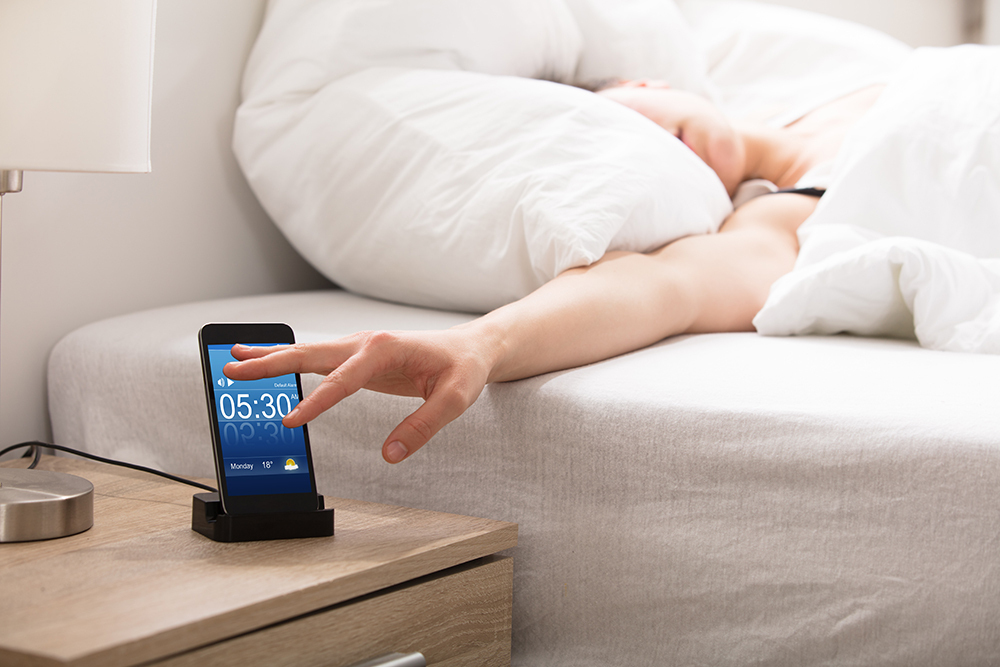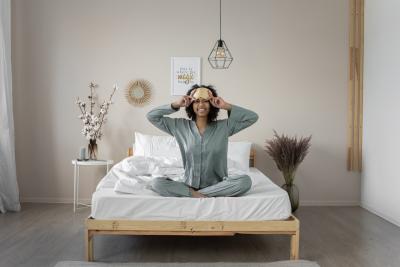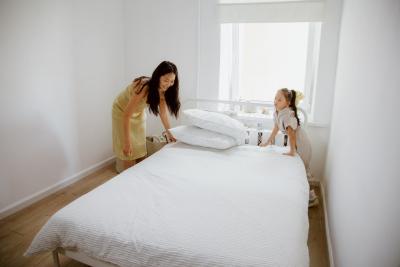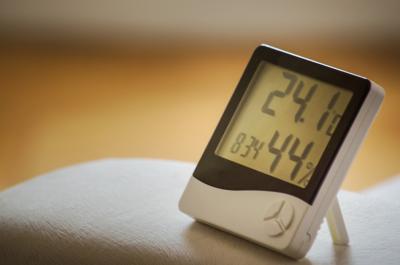Whether it's because you had a late night, suffered from fragmented sleep, or aren't keen on your plans for the day ahead, we've all been tempted to press the snooze button. Unfortunately, the world isn't sleeping enough and pressing the snooze button isn't helping.
Up to 2.3 billion people worldwide experience some form of insomnia, resulting in sleep deprivation. Repeatedly snoozing your alarm can lead to chronic sleep deprivation and increased sleep disturbances.
Reports have found that Americans set up to four different alarms to wake up, with around 1 in 3 Americans reporting that they do not get enough sleep. Could this suggest our reliance on alarms is impacting sleep?
More than half of respondents hit the snooze button every day
To understand how many people rely on the snooze button, we surveyed almost 3,000 people, and the results were surprising. More than half (57%) of those surveyed said they used their snooze button daily, with 74% using an alarm to get up each morning.
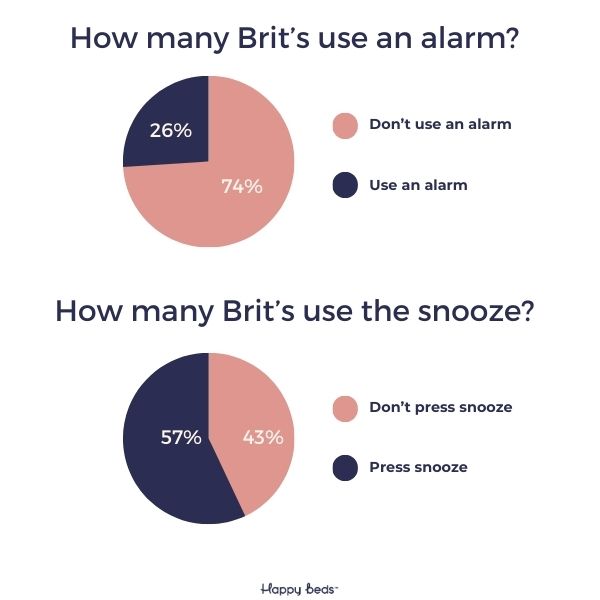
But just how much is the snooze button used?
A quarter press the snooze button three to four times every morning
A quarter (25%) of those surveyed who said they hit the snooze button do it between three and four times daily. A further 1 in 11 (9%) said they repeatedly pressed snooze five or more times.
The vast majority of those who hit the snooze, 66%, said they do so once or twice each morning. But what is causing so many to reach for the snooze and get those extra 10 minutes (or nine minutes if you are an iPhone user) of 'sleep'?
66% said they don't get the sleep they need
We asked, on average, how many hours people slept each night and compared this to the number of hours of sleep they would like. The answer is clear: we are not getting the rest we need. Two-thirds (66%) said they do not sleep enough each night and would like to get more.
We also found just under a third of people surveyed (30%) said they get between four and six hours of sleep per average night. However, 42% would like between six and eight hours, and a further 49% would like eight to ten hours, suggesting that many long for extra time in bed.
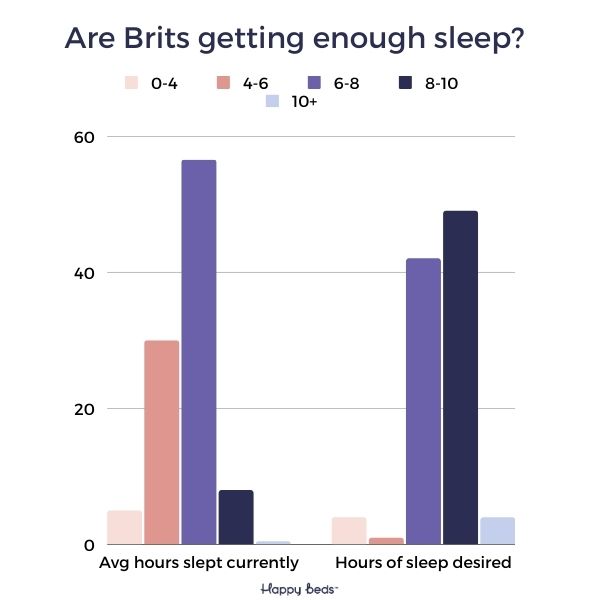
But the significant reliance on the snooze button could stop you from getting those extra hours.
Why snoozing can ruin your sleep
Snoozing your alarm can confuse your circadian rhythm
Your circadian rhythm is an internal, 24-hour body clock. It regulates your alertness and sleepiness over a day, responding to the changes in light. Due to the light in the morning, your brain knows it is time to wake.
Interestingly, studies have found that the change in clocks in autumn can reduce the time spent asleep as we adapt to a new sleep routine and changes in daylight. The week after the clocks change, many people wake earlier and have trouble falling asleep.
If we compound this with the prolonged use of the snooze button, your body will get confused. Essentially, it won't know when it is time to wake and go to sleep as the snooze button encourages you to go back into deep sleep and wakes you within 10 minutes (stopping that sleep in its tracks).
Snoozers are 'chronically tired'
Snoozers - people who regularly use the snooze button - are chronically tired. That's according to a study conducted that found women are also more likely to hit snooze.
Those who did snooze regularly were more tired than those who woke up naturally, without an alarm. This is likely because waking up to daylight - without external disturbances - regulates your circadian rhythm. As you wake naturally to the light, your body experiences a stress response and using an alarm can interrupt that.
Using the snooze on your alarm increases sleep inertia
Repeatedly pressing the snooze button can result in your body assuming the first chimes were a false alarm. Leaving it in a state of shock when it frequently goes off. The result? Sleep inertia, or in other words, that groggy, tired feeling you get and can't shake for a few hours after waking.
One study found that 70% of participants used snooze on their phones and experienced increased fatigue upon waking. This can significantly affect the ability to function the next day.
Your sleep will be much lighter, causing you to wake up frequently
If you regularly snooze but feel like your rest is much worse, it could be your alarm. Another study discovered that snoozing is associated with lighter sleep, making people more likely to experience this about an hour before waking. However, it did find that snoozers are not more likely to nap throughout the day.
But as sleep is lighter, environmental factors such as your partner snoring or noise outside are more likely to disturb you, resulting in a lack of sleep.
You are more likely to reach for the caffeine when snoozing
A previously mentioned study also measured caffeine intake and discovered that it increased significantly on days when participants used the snooze button.
This could be because when we wake naturally, our stress levels (or cortisol levels) are at their peak, and they enhance our alertness. But repeatedly snoozing disrupts your sleep cycles - mainly if you fall into a deep sleep and wake up before that cycle naturally ends. So, you are more likely to reach for caffeine because you don't feel as alert as you should.
But it's essential to be careful as drinking too much caffeine in the morning, while cortisol levels are high, can lead to increased caffeine tolerance. Therefore, you reach for it more, and the cycle continues.
Thankfully, there are coffee alternatives to improve your sleep.
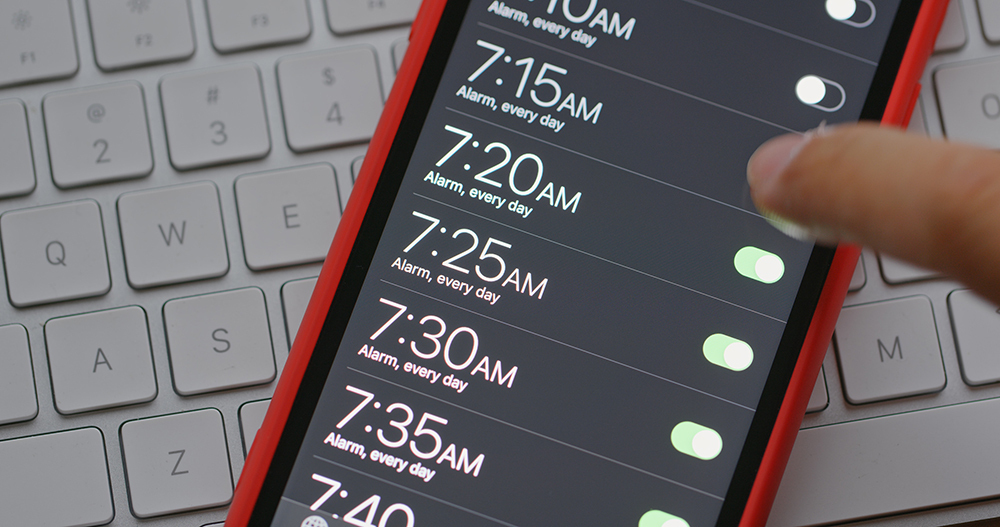
7 tips to stop reaching for the snooze button
You may need your alarm to get up for work each day, but you can control the snooze, and we are here to help.
1. Stop setting multiple alarms
You may be tempted to do this, especially if you have to wake up extremely early (for a flight, for instance). But doing this can encourage you to opt for the snooze button as you know another alarm is set to wake you.
If you are worried about waking up, try a week without hitting the snooze and setting the alarm just once and compare your sleep to the previous week.
2. Choose a more melodic alarm tone
Do you have the default alarm tone on your phone and feel stressed when you hear it? Well, this is your chance to change it. Studies have shown that participants preferred alarms with melodic qualities when waking up. That same study also indicates that low-pitch alarms can help reduce sleep inertia in children.
3. Make it hard to snooze
If your alarm is hard to reach, it's harder to snooze. Move your alarm to the other side of your room, where you must get out of the bed to turn it off. That way, you are already out of bed, so getting on with your day is much easier.
4. Put your foot out of the bed
If you are struggling to wake up and the alarm has gone off, remove your foot under the blanket and put it on the floor. The immediate temperature change can help wake you and tell your brain it is time to get up.
Plus, you are already halfway out of bed, so getting the rest of you up will be much easier than curling up under the blanket.
5. Switch the light on
Light is the enemy of sleep. If you are struggling to wake up, you need light. Switch the lights on when the alarm goes off so your brain knows it is time to wake up and prepare for the day.
If you find your bedroom light too harsh, you could choose a lamp replicating natural sunlight and program it to wake you up to keep your circadian rhythm in sync.
6. Use your favourite scent to get you up
Fans of The US Office will remember the episode where Michael Scott stepped on his George Foreman grill when getting out of bed, as he liked to wake to the smell of cooked bacon. While we do not encourage you to put a grill next to your bed, you could use other scents to help you rise.
Some coffee makers allow you to program it so you can wake up to the smell of freshly brewed coffee.
7. Be realistic with your alarm
You are likelier to snooze if your alarm is set too early or unrealistic. Instead, be realistic with when you want to (and need to) wake up to resist the urge to snooze. If you can't change the time of your alarm, stop the snooze as a test for a few days. We promise you will start feeling better as you resist the urge to rest for 10 minutes.
If you're still struggling to get a quality night's sleep, it might be because your mattress isn't the best it could be. Whether it's old, damaged, or doesn't provide the right comfort or support, your mattress can significantly influence how you sleep and wake.
That's where we can help. Choose a new mattress or bed to provide the support you need. If you’re not sure what mattress will suit you, then make sure to check out our mattress buying guide for plenty of information.


